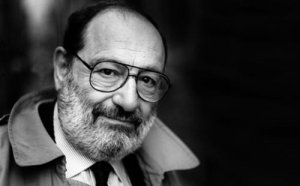Umberto Eco: Novelist and Philosopher


Reviewed and approved by the psychologist Gema Sánchez Cuevas
Umberto Eco was an Italian novelist, philosopher, literary critic, semiotician, and college professor. Eco’s known for his 1980 novel, Il nome della rosa (The Name of the Rose). It’s a historical mystery novel that combines fiction, biblical analysis, medieval studies, and literary theory.
Umberto Eco was born on January 5, 1932, in Piedmont, northern Italy. His father, Giulio, was an accountant and soldier. As a child, Umberto spent hours in his grandfather’s bodega. There, he discovered literature by reading the old man’s books, which included works by Jules Verne, Marco Polo, and Charles Darwin.
After World War II, Eco joined a Catholic youth organization. Not long after, he became their national leader. However, he resigned in 1954 amid protests against Pope Pius XII’s conservative ways. Nonetheless, Eco had a very good relationship with the Church.
Afterward, Eco worked as a cultural editor for the state radio Radiotelevisione italiana (RAI) and he taught in the University of Turin from 1956 to 1964. During his time in the RAI, Eco became friends with a group of groundbreaking artists known as Gruppo 63. The group was made up of painters, musicians, and writers and had a great influence on Umberto Eco’s literary career.
Umberto Eco’s Literary Legacy
As a semiotic, Umberto Eco tried to interpret cultures through their signs and symbols. He studied religious languages, banners, dress codes, musical sheets, and even cartoons. During his teaching days in the University of Burgundy, Eco published over 20 non-fiction books about his cultural findings.
His literary work is unique because he translated academic thoughts into novels. Eco found a way to bind his academical and work life as a fiction writer.
The Name of the Rose was published in Europe, sold over 10 million copies, and was translated into 30 languages. Eco was a producer in the successful 1986 adaption of his novel, directed by Jean-Jacques Annaud and starring Sean Connery.
“I believe that what we become depends on what our fathers teach us at odd moments, when they aren’t trying to teach us. We’re formed by little scraps of wisdom.”
-Umberto Eco-
Throughout his life, Eco kept teaching philosophy, and later semiotics, at the University of Burgundy.
He contributed a lot to mass media culture, which you can see for yourself in Fenomenologia di Mike Bongiorno (Phenomenology of Mike Bongiorno). Eco’s influence made him well-known and, as a consequence of this, he was honored with over 30 honorary titles from respected institutions such as Indiana University Bloomington or Rutgers University.

The Name of the Rose and Other Literary Works
His famous novel is set in an Italian monastery in the 14th century. In this sublime setting, murders occur. Friars are murdered by peers who are trying to hide a lost Aristotle treaty on philosophy. Against all odds, Eco managed to captivate a large audience with this novel of suspense and mystery.
In his book, Eco establishes several parallel philosophical conflicts such as absolute truth vs. one’s interpretation, stylized art vs. natural beauty, predestination vs. free will, and, of course, spirituality vs. religion. In other words, fundamental disagreements in every human being. This makes way for the constant talk of traditional medieval Christianity over postmodernism. Eco manages to pinpoint the limits of each.
His other works have wildly different protagonists that sink their roots in history, such as a clairvoyant crusader in the Middle Ages, a castaway of the 1600s, and a 19th-century physicist. All of his novels provoked semiotic reflections through convincing fictional stories. Eco always stroke a strange balance between history, reality, and fiction in his literary works.

Umberto Eco’s Legacy to Universal Thought
In September 1962, Eco married Renate Ramge, a German art teacher who he had a son and a daughter with. Eco split his time between an apartment in Milan and a vacation house in Rimini.
In 1988, at the University of Bologna, Eco created an unusual study program called Western Anthropology. This study program was quite revolutionary for its time because it was mostly under the perspective of non-Western people (African and Asian scholars).
Eco developed an international network of transcultural collaboration with French anthropologist Alain le Pichon. This was the premise of The Unicorn and The Dragon, where Eco talks about knowledge in China and Europe.
Eco pointed out the trend of classifying symbols, ideas, and concepts of foreign cultures and adapting them to our own system of cultural references. The most outstanding example of this is Marco Polo. Traveling throughout the East, Polo saw a rhinoceros but identified it as a unicorn. Marco Polo had named the animal referencing the Western conception of a unicorn: a beast with a horn.
Many travelers talked about mermaids or exotic and fantastic places. Eco proposed that this was a consequence of people’s culture. This is because when people try to comprehend something unknown, they use a filter of what they do know.
Eco was a pioneer in interpreting the world through our own cultures. Umberto Eco founded and developed one of the most important approaches of modern semiotics, known as interpretative semiotics.
Eco died in Milan due to pancreatic cancer on February 19th, 2016. He was 84 years old.
Umberto Eco was an Italian novelist, philosopher, literary critic, semiotician, and college professor. Eco’s known for his 1980 novel, Il nome della rosa (The Name of the Rose). It’s a historical mystery novel that combines fiction, biblical analysis, medieval studies, and literary theory.
Umberto Eco was born on January 5, 1932, in Piedmont, northern Italy. His father, Giulio, was an accountant and soldier. As a child, Umberto spent hours in his grandfather’s bodega. There, he discovered literature by reading the old man’s books, which included works by Jules Verne, Marco Polo, and Charles Darwin.
After World War II, Eco joined a Catholic youth organization. Not long after, he became their national leader. However, he resigned in 1954 amid protests against Pope Pius XII’s conservative ways. Nonetheless, Eco had a very good relationship with the Church.
Afterward, Eco worked as a cultural editor for the state radio Radiotelevisione italiana (RAI) and he taught in the University of Turin from 1956 to 1964. During his time in the RAI, Eco became friends with a group of groundbreaking artists known as Gruppo 63. The group was made up of painters, musicians, and writers and had a great influence on Umberto Eco’s literary career.
Umberto Eco’s Literary Legacy
As a semiotic, Umberto Eco tried to interpret cultures through their signs and symbols. He studied religious languages, banners, dress codes, musical sheets, and even cartoons. During his teaching days in the University of Burgundy, Eco published over 20 non-fiction books about his cultural findings.
His literary work is unique because he translated academic thoughts into novels. Eco found a way to bind his academical and work life as a fiction writer.
The Name of the Rose was published in Europe, sold over 10 million copies, and was translated into 30 languages. Eco was a producer in the successful 1986 adaption of his novel, directed by Jean-Jacques Annaud and starring Sean Connery.
“I believe that what we become depends on what our fathers teach us at odd moments, when they aren’t trying to teach us. We’re formed by little scraps of wisdom.”
-Umberto Eco-
Throughout his life, Eco kept teaching philosophy, and later semiotics, at the University of Burgundy.
He contributed a lot to mass media culture, which you can see for yourself in Fenomenologia di Mike Bongiorno (Phenomenology of Mike Bongiorno). Eco’s influence made him well-known and, as a consequence of this, he was honored with over 30 honorary titles from respected institutions such as Indiana University Bloomington or Rutgers University.

The Name of the Rose and Other Literary Works
His famous novel is set in an Italian monastery in the 14th century. In this sublime setting, murders occur. Friars are murdered by peers who are trying to hide a lost Aristotle treaty on philosophy. Against all odds, Eco managed to captivate a large audience with this novel of suspense and mystery.
In his book, Eco establishes several parallel philosophical conflicts such as absolute truth vs. one’s interpretation, stylized art vs. natural beauty, predestination vs. free will, and, of course, spirituality vs. religion. In other words, fundamental disagreements in every human being. This makes way for the constant talk of traditional medieval Christianity over postmodernism. Eco manages to pinpoint the limits of each.
His other works have wildly different protagonists that sink their roots in history, such as a clairvoyant crusader in the Middle Ages, a castaway of the 1600s, and a 19th-century physicist. All of his novels provoked semiotic reflections through convincing fictional stories. Eco always stroke a strange balance between history, reality, and fiction in his literary works.

Umberto Eco’s Legacy to Universal Thought
In September 1962, Eco married Renate Ramge, a German art teacher who he had a son and a daughter with. Eco split his time between an apartment in Milan and a vacation house in Rimini.
In 1988, at the University of Bologna, Eco created an unusual study program called Western Anthropology. This study program was quite revolutionary for its time because it was mostly under the perspective of non-Western people (African and Asian scholars).
Eco developed an international network of transcultural collaboration with French anthropologist Alain le Pichon. This was the premise of The Unicorn and The Dragon, where Eco talks about knowledge in China and Europe.
Eco pointed out the trend of classifying symbols, ideas, and concepts of foreign cultures and adapting them to our own system of cultural references. The most outstanding example of this is Marco Polo. Traveling throughout the East, Polo saw a rhinoceros but identified it as a unicorn. Marco Polo had named the animal referencing the Western conception of a unicorn: a beast with a horn.
Many travelers talked about mermaids or exotic and fantastic places. Eco proposed that this was a consequence of people’s culture. This is because when people try to comprehend something unknown, they use a filter of what they do know.
Eco was a pioneer in interpreting the world through our own cultures. Umberto Eco founded and developed one of the most important approaches of modern semiotics, known as interpretative semiotics.
Eco died in Milan due to pancreatic cancer on February 19th, 2016. He was 84 years old.
All cited sources were thoroughly reviewed by our team to ensure their quality, reliability, currency, and validity. The bibliography of this article was considered reliable and of academic or scientific accuracy.
- Proni, G. (1987) Umberto Eco: An intellectual biography. Londres: De Gruyter Mouton.
This text is provided for informational purposes only and does not replace consultation with a professional. If in doubt, consult your specialist.







